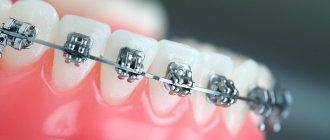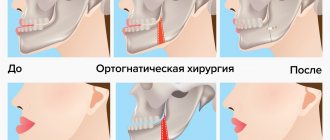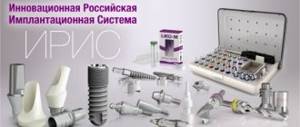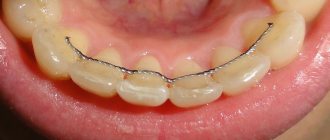762
Braces are one of the most effective methods of correcting malocclusion. Such orthodontic treatment is quite expensive and takes a long period of time.
Young people of conscription age often have a question: is it possible to go into the army with dental braces or get a deferment for the period of correction of defects with braces.
Do they take into the army with a deep bite?
Many people are interested in this very question, whether they are recruited into the army with an incorrect bite, but in this matter much depends on the degree of acquired deformity.
Exemption is possible in the following cases:
- second degree with separation up to 10 mm;
- third degree with separation of more than 10 mm.
In order to confirm your diagnosis, you must submit all the necessary documents to the military registration and enlistment office. If questions arise, specialists from the medical commission can conduct an additional examination of the conscript.
If confirmation of the presence of deformation is required, then you must have supporting documents on hand. When performing surgical intervention, a deferment period of 6 months is issued for the complete recovery of the body.
The option of a conscript refusing to undergo surgery is also being considered, so in case of such symptoms, the commission can assign category “B” (exemption from military service and transfer to reserve troops).
In most cases, braces are not a contraindication for military service. At the same time, the procedure is quite expensive and before it is carried out, it is necessary to take into account all sorts of nuances.
DO YOU GIVE DEFERMENT FROM THE ARMY IF YOU HAVE BRACES INSTALLED?
They take you into the army with braces. Since the installation of orthodontic structures by a conscript is not considered by the Schedule of Diseases as a serious reason for granting a deferment while using braces and requiring the attention of doctors at the medical examination.
Thus, having braces is not a reason for granting a deferment from the army. They are taken into service with them; their presence does not affect the fitness category in any way. Therefore, you should think in advance whether it is worth installing them at a time when there is a risk of going to serve in the army. After all, caring for braces in the field will be extremely problematic. There won't be an orthodontist nearby either.
Only those young people who have had an orthodontic device installed to correct a severe malocclusion have a chance to be exempt from conscription. If the system was installed only to correct an aesthetic defect, then the young man will be called upon to serve.
Having braces on your teeth and serving in the army in 2021
Braces are a special design that is used to correct malocclusion or straighten teeth. The installation is made only to eliminate the unsightly aesthetic appearance, therefore such an indication does not appear to be a basis for exemption from military obligations.
There are some exceptions when installing braces, which are detailed in the list below:
- use of surgical treatment to correct malocclusion with placement of 5–10 mm. In this case, chewing activity is at least 60%;
- the use of surgical techniques with a third degree of separation of more than 10 mm.
The list of diseases considered during the medical commission is regulated by Art. 56. "Disease Schedule". When studying such items, the conscript has the right to exemption when diagnosed with malocclusion, but no specific article is provided.
If surgical treatment is carried out, the conscript receives a temporary deferment for 6 months. After time, the patient recovers, and after a re-examination he can serve in the army.
If there are serious problems that have not been eliminated, after treatment the medical commission may assign category “D”. Such cases are quite rare in practice.
Malocclusion and call
Malocclusion is a dental anomaly (violation of the arrangement of the dentition relative to each other). The examination of a young man with such an anomaly is carried out by the Military Medical Commission (MMC) according to Article 56 of the Schedule of Diseases:
- If the dentition is displaced up to 5 mm (inclusive), class I is assigned, and the conscript is issued a summons with the possibility of limited conscription (category “B”). The examination takes place under paragraph “c” of Art. 56. Under the same point, young men with an anomaly of the second degree and with a malocclusion of 5-10 mm with preservation of chewing function of more than 60% are examined.
- If the dentition is separated by 10 mm or more, the young man receives category “B” and a military ID for health reasons. If the anomaly remains within 5-10 mm, but the chewing function has suffered by 60% or more, the young man is also considered unfit for military service in peacetime. He is assigned category “B” and given a military ID. The examination is carried out under paragraph “b” of Art. 56.
If a young man has undergone an operation to correct his bite, and six months have not passed since its completion, he receives a deferment for recovery. Then he undergoes a medical examination again and can be drafted into the army on a general basis.
Author:
Kirill Savchenko
Didn't understand the article and need help?
auto RU
If, upon initial registration, the young man fell under paragraph “b” of Art. 56 of the Schedule of Diseases, he can be sent for treatment and then undergo an examination under Article 61 of the same document.
If he refused the intervention of surgeons, the results of treatment did not bring the expected results or worsened the situation, the conscript can be examined under paragraph “a” or “b” of Art. 56. He will receive category "B". Sometimes, after an unsuccessful intervention, conscripts are declared completely unfit for military service (category “D”).
What problems may arise with braces during actual service?
Wearing braces can cause the development of certain problems in the body:
- poor digestion of food;
- the need to follow a diet;
- damage to tooth enamel and wear;
- inflammation and severe sensitivity of the gums;
- speech apparatus defect, slightly distorted speech;
- facial deformation.
If, after installing braces, the complications described above were recorded, then you need to consult a qualified orthodontist.
Is there a delay when installing braces?
Many people are interested in the question of whether there is a delay in installing braces and what needs to be done to get it.
A deferment for the placement of braces can only be issued if the conscript has a second-degree malocclusion with a separation of at least 5 mm and a chewing activity of less than 60%.
In order to obtain a deferment, you must submit the relevant documents to the medical commission, and after reviewing them, the medical commission will make the necessary decision.
How does a military commission make a decision?
If there is an abnormal arrangement of teeth, you should seek help from a dentist. The diagnosis, the degree of chewing dysfunction, and the severity of the disease are determined by a specialist. The information is recorded in the outpatient card. You must take a photocopy of the statements with you to the commission at the military registration and enlistment office.
This is important to know: Are people with color blindness accepted into the army?
The commissariat examines the conscript, studies the preliminary notes of doctors, and sends him for additional examination. After re-confirmation, a fitness category is assigned. If the defect can be corrected with treatment, a deferment is given for 6-12 months, after which the conscript’s case is reconsidered.
List of required documents
Confirmation of the diagnosis is carried out upon submission of the necessary package of documents to the medical commission:
- conscript's medical card;
- conclusion of the attending physician;
- an x-ray that confirms the presence of pathology.
After the conscript submits all the necessary documents, he is examined by a dentist and orthodontist. If the diagnosis is confirmed, a temporary deferment is issued for further treatment and elimination of the problem.
Documents for deferment
To receive a deferment, the conscript must provide the military dentist with a number of documents confirming dental pathology. This list includes:
- Medical record with copies of the doctor’s verdicts;
- X-ray confirming the presence of pathology.
After carefully studying all the documents, the person will be examined by a dentist, after which he will be referred to an independent orthodontist to confirm the diagnosis.
Only after this will the final verdict be made. Also, after a medical examination, the patient may receive a referral for orthodontic treatment.
What is braces activation and how often is it performed?
In this article, find out which braces are best to choose, taking into account the popularity rating of the systems.
Here we will discuss the pros and cons of installing braces at age 30.
What to do if you need to serve in the army during treatment
Installing braces requires careful oral care and mandatory personal hygiene. Therefore, when passing a medical commission, doctors may suggest removing the structure, but the final decision must be made by the conscript.
In order not to lose the funds spent, you can adhere to the following recommendations:
- leave the inserted structure for its entire service life. In many parts there is a dentist and if problems arise you can contact him;
- use of legal grounds to obtain exemption from military service.
In the “List of Diseases” paragraphs there is no specific basis for receiving category “B” or “D”, but it is possible to undergo a full examination and identify other pathologies that are an indication for exemption from military obligations.
Recommendations
And yet, in order to avoid inconvenience, long discussions and doubts, it is better to eliminate all problems in the oral cavity before adulthood, and it does not matter - to satisfy aesthetic needs or to improve physical health.
If, indeed, conscription into the army coincided with orthodontic treatment, you need to try to provide all the documents in order to receive a deferment, since there will be no opportunities, especially in the field, to care for the oral cavity and systems.
And such an attitude towards treatment can result in serious complications that will have to be eliminated when you get home.
Remember that the army is not a resort, and there are not the best conditions for improving your health and taking care of yourself.
Moreover, braces will interfere with the processing of army food and impair diction, despite the fact that both functions are necessary during service.
Reviews
Reviews about the presence of braces and obtaining the appropriate category for military service have unequal opinions, since in most cases the situations are purely individual and require separate consideration.
I also got braces right before the army and didn’t even realize that a summons would come. When passing the medical commission, I was told that they were not a hindrance, so I would have to serve like everyone else. Thank God I didn't have any discomfort.
Alexey, Saratov
Yes, braces seemed easy to install, but they require detailed care. I had surgery, so they gave me a delay of 6 months, and during this period I eliminated all the existing problems.
Vladimir, Rostov-on-Don
Is it possible to correct an overbite?
In fact, there are only a few treatment options for maxillofacial pathologies. They can be used individually or in combination.
Surgical treatment will be the most effective. After the operation, the conscript can try to join the army again only after a 6-month rehabilitation period.
If during this time you manage to get rid of the defect, then the treasured summons to enlist in the army will be in your hands! If a conscript cannot or does not want to solve bite problems, then he is assigned fitness category “B”.
An equally exciting question directly related to malocclusion and the army, which is often asked by clients of the Military Bar Association, is whether it is possible to get into the army with braces. Of course, wearing braces is not a reason to refuse a summons.
Despite the fact that braces require constant care, and specialists must correct the teeth straightening process, this does not become a reason for postponing military service.
The only reason that is acceptable for a delay is surgical intervention to correct problems with a 2-3 degree bite and a defect of more than 10 mm. If the conscript decided to simply correct deficiencies in the appearance of his teeth by installing braces, then this is not considered a valid reason for avoiding service.
Sometimes representatives of the military commission still make concessions, but such cases are too rare.
The conscript has only one thing left to do - make a decision to stay in braces without providing the systems with the necessary care, especially during military field practice. Or remove the braces to fully perform all tasks without worrying about providing proper care with systems to correct bite problems.
This is important to know: What day does military service begin?
If you have any doubts about whether you can count on exemption from the army or service without restrictions due to your health condition, it is better to consult with an experienced military lawyer who will help you understand the nuances and develop the right course of action.











